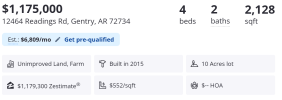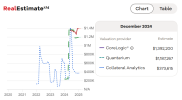I watched the video and heard the claims made by Phil. Waivers, to me, have no more impact than a cash sale; both do not require an appraisal.
To be clear; I do not support waivers as I believe this trend could be abused by participants in the market by manipulating sale prices to achieve a desired LTV to trigger said waiver. Concessions, paid back to the buyer could resettle the inflated offer back to the original offer. Often, these concessions go unreported in the MLS and on Zillow and other sites.
The $430K sale appears to have a long view of the lake. Perhaps the buyer paid a premium for the long view of the lake, rather than just a view across the narrow portion. I do not see any other sale balloons showing other sales have this unique view. There are far too many variables to just declare that the waiver caused a "too-high-of-a-price sale". I don't buy it.
Also, the 430K waiver sale took place in April. The other prior sales took place in February. In my area, the market can transition quickly and dramatically from winter to spring.
Also, there was no discussion as to the overall features of the 430K sale. George Hatch even indicated a rather large deck. Perhaps that large deck contributed to the premium price. Such features will increase the price/sf. The deck looks like the kind that could host large gatherings. Large decks are very expensive to build.
Also, I do not consider our job is to shepherd the real estate market. We observe and report. The market takes care of that itself to it's benefit or detriment. A single appraisal report cannot shield a mass upswing or downturn in the market.
Also, if an appraisal were ordered on this sale, how do we know that it would not have appraised out? Or, if it did not, how do we know if the buyer would have made up the difference between the OMV in the report and the sale price? Answer, we don't.
Also, Phil seems to think that a RE agent's fiduciary responsibility extends to a requirement to inform buyers that they should seek an appraisal. They themselves are real estate professionals that can help a buyer with data to see what is an appropriate sale price for a house. See below for a real estate agent's fiduciary responsibility per NAR. No where in the list does it state that an agent must, or should, suggest the buyer get an appraisal, specifically.
The real cancer:
I believe the real cancer in the data is misreported sale prices and omissions of details regarding concessions etc... My example of such data cancer are two sales comparables (both discovered in the last month no less). In both cases I called the agent to verify the conditions of the sale. You all should do that. Verifying why the buyer paid the amount they do is eye-opening. Yeah, it takes more time, but it is worth it.
1) The first sale I came across had a sale price reported as $790K by Zillow. The actual price ended in an odd amount. I use Total as my software. The data is shared with other users of Total. After you type in the address, you can see how other appraisers, using the same software, used the same comp. When I started typing in the address, I noted that a few other appraisers used this sale at the $790k mark. I called the agent. The agent verified the price was actually $905k. She could only speculate as to why the price in Zillow was off more than $100k.
2) Another sale I came across indicated a price that was just over $400k. The MLS indicated a 3 car garage. I called the agent as the MLS photos and assessors data showed only a 1-car garage. Turns out the price paid to the seller was actually $5k less than what the MLS indicated. The other 5k? That was what the buyer paid to procure 2 garage stalls across the alley that was not connected to the subject property nor was owned by the seller (the garage stalls were part of a bank of garages that can be leased and are part of an HOA). The agent just combined the two transactions. And yes, other appraisers used the MLS reported price, not the correct price.
These two are just in the last month.
I find that most sale prices are accurate, but that sale concessions are not always reported. Also, don't assume that all concessions are for closing costs. About half of them, I find, are for repairs the buyer will incur after they take possession.




